A contingent of faith leaders and their supporters gathered in the state Capitol Thursday to back a proposed expansion of the state’s tax credit scholarship program for low-income students.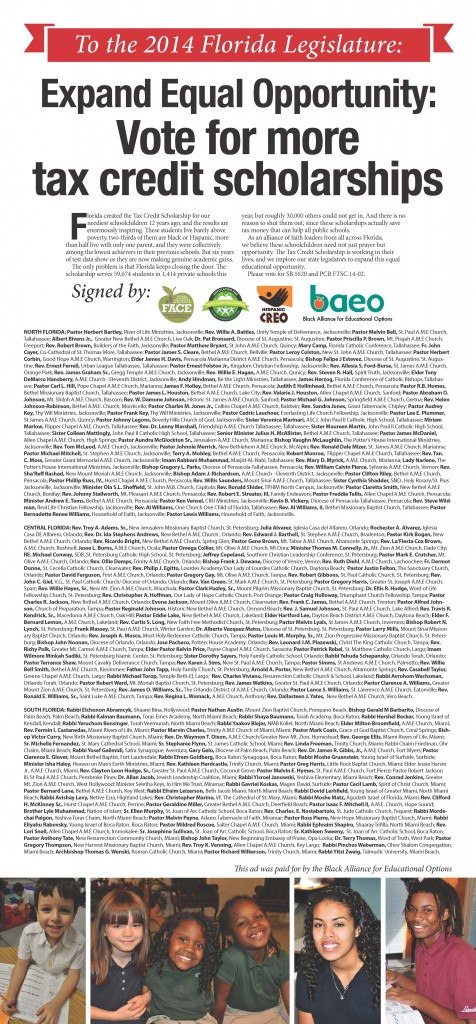
About 200 of them packed a legislative room before the proposed bill got its first hearing before the House Tax & Finance Subcommittee. More than half of them were private school students from Jacksonville, Orlando and Tallahassee, and most wore bright-yellow shirts that said, "Expanding Equal Opportunity."
"We will fight for a cause that is a righteous cause," Isha Haley with the Florida Interfaith Alliance for School Choice told the crowd. "There are too many of our babies that are dying. There are too many of our babies that can't read and write. ... They need an opportunity."
One of the best things to happen to public education "is the recognition that not every school works for every child," said Robert Ward, pastor of Mt. Moriah Baptist Church in St. Petersburg. "This scholarship has helped to put many students on the right path. It is by no means a cure all ... but surely it is one tool for parents who struggle with poverty."
The turnout was organized by the interfaith group, which is affiliated with the Florida Alliance for Choices in Education, an umbrella group for an array of school choice organizations, including Step Up For Students. The latter administers the scholarship program and co-hosts this blog.
Nearly 60,000 students now use the school choice scholarships to attend private schools, about 80 percent of which are faith-based. Students must qualify for free- or reduced-price to be eligible for the scholarships. Two-thirds are black or Hispanic, and test data shows they tended to be the lowest academic performers in the public schools they left.
Mikeya Brown, a 10th grader at Tallavana Christian School west of Tallahassee, described herself as “one of the fortunate ones.” She said she attended public schools in Gadsden County before receiving a tax-credit scholarship in fourth grade. She said she benefited from a Christian-school environment, which her parents could not afford on their own. (more…)
Editor's note: This week is National School Choice Week, so it's only fitting that we bring you this statistical snapshot of how deeply school choice has taken root in Florida, arguably the leading state for expanding learning options.
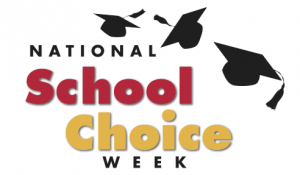 Too many of those who hail Florida as a national leader in school choice miss the breadth of change afoot. Yes, students are choosing charters and tax credit scholarships and vouchers in ever-increasing numbers. But school districts themselves are also helping to create a new normal in public education, and the latest enrollment numbers bear that out.
Too many of those who hail Florida as a national leader in school choice miss the breadth of change afoot. Yes, students are choosing charters and tax credit scholarships and vouchers in ever-increasing numbers. But school districts themselves are also helping to create a new normal in public education, and the latest enrollment numbers bear that out.
Get this: 1.5 million students in Florida last year attended something other than their assigned neighborhood school. That's 42 of every 100 students in PreK-12.
The "Changing Landscape" document below is a project of the Florida Alliance for Choices in Education and Step Up For Students, and it was produced in partnership with the state Department of Education's Office of Independent Education and Parental Choice. The state tracks a wide variety of educational options in the 67 school districts, and the numbers are eye-opening.
In 2012-13, one of every four K-12 students chose a district-operated school that was outside their neighborhood, whether it be through "open enrollment" polices or to take advantage of a special magnet school or career academy or International Baccalaureate program. At the same time, non-district options experienced remarkable growth from the previous year: charter enrollment up 13 percent, vouchers for disabled students up 10 percent, tax credit scholarships for low-income students up 27 percent. And the biggest voucher program in Florida continued to be for pre-kindergarten, last year serving more than 144,000 4-year-olds in private centers and schools.
These are seismic shifts in the way education is being delivered and can only serve to stimulate more demand. Children who succeed in a school environment that is tailored to their needs will become adults who insist on the same for their offspring. As these numbers tend to suggest, that type of generational change is already under way.
Editor’s note: Andrew Campanella is president of National School Choice Week. This concludes our #schoolchoiceWISH series.
As school choice supporters, we hope children who benefit from educational opportunity will “dream big.”
We tell students to aim for their loftiest goals and to never give up.
My #schoolchoiceWISH is that school choice organizations do the same – dream big – and turn 2014 into a Year of New Opportunity for children across America.
This isn’t mere rhetoric. We can do this.
Support for school choice in all of its forms is at an all-time high. This support is evidenced not just by public opinion polls, but also in the scores of school choice and education reform organizations that exist today. These groups are doing remarkable work at the state and national levels, and they're working together and collaborating more effectively than ever.
But for school choice to become an even more powerful movement, and for 2014 to become a Year of New Opportunity for families across America, these groups can forge even closer partnerships, either by planning joint events or partnering on projects designed to educate and empower parents and families.
To individual parents – "school choice" is not just about charter schools, or private schools, or traditional public or magnet schools, or online learning and homeschooling. It’s about having a choice of all of these options, being able to make a choice, and selecting the learning environments that are right for their individual children.
When school choice organizations work together, the collective messaging of these partnerships and this broad, familiar definition of school choice resonates with families.
It goes without saying that a charter school association and a private school choice group might not agree on every policy issue, or that a homeschooling organization and a magnet school consortium will not always find common ground. And yes, organizations do compete for scarce funding — that's an undeniable fact.
But National School Choice Week is one proof point that collaboration is possible, and that despite differences on specifics, school choice and education organizations can come together on the basics. Later this month, hundreds of organizations, thousands of schools, and millions of Americans will join together at 5,500 events across the country to celebrate all types of effective education options for children. (more…)
"Where are the parents who support school choice?"
"Where are the parents who support parental empowerment?"
"Where are the parents whose children benefit from education reform?"
These are typical questions from traditional parenting groups, groups that sometimes say they represent Florida parents in all educational matters. They have to ask the whereabouts of moms and dads of more than 1.5 million schoolchildren of choice, because such parents don’t tend to be in their membership files.
To the extent these choice parents are low-income and single moms who choose options such as the tax credit scholarship, they do indeed tend to be less visible in the political sphere.
Get ready, because that’s changing.
Early Wednesday morning, families from all over Florida, from Miami’s inner city neighborhoods to rural Pasco County, will board buses with their children and teachers and travel five to 10 hours to get to Tallahassee for School Choice Day. Organizers expect more than a thousand participants to gather and show lawmakers, traditional parenting groups, and everyone else the real face of parental school choice.
They won’t look like right-wing corporations. There’s a good bet they will be racially and economically diverse. In other words, they will probably look like you and me. (more…)
Editor’s note: Wendy Howard is executive director of the Florida Alliance for Choices in Education, which includes a broad range of school choice organizations. The views expressed here are her own and not that of FACE.
Four years after my daughter Jessica Howard began a petition drive to make it easier for students to access virtual education in Florida, she is still not eligible for the virtual provider of her choice. No wonder so many parents settle for learning options that may not necessarily be the best option. There is so much bureaucracy and public attack if a parent merely wants more choice.
As a parent advocate, I have met many parents who are desperate for just that.
One told me her child wrote a suicide note after severe bullying at her school, but fortunately everything turned out okay after they found another option. Another couldn’t transfer her child to a virtual school – despite severe allergies – because of the “seat time” restrictions that were in place at the time. Instead, she had to access a district’s “hospital homebound” program, which cost taxpayers an exorbitant amount of money.
In other cases, parents have children who are failing in the system, or are far ahead of the system, or are pursuing athletic or professional careers that require some reasonable flexibility with academic schedules. There are endless reasons why some families want to choose schools outside of their traditional zoned school, or prefer Option X to Option Y, or want to mix and match those options so their kids can thrive.
All of those parents and their stories have made me wonder: Why can’t we just let all parents decide? Why are we limiting their choices?
Why not all parents, all choices? (more…)
Florida’s new education commissioner is known for his zealous support of charter schools and vouchers and other learning options that some critics see as anti-public school.
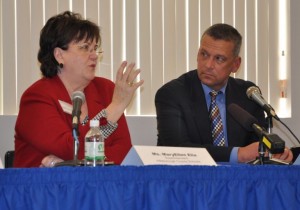
Florida Education Commissioner Tony Bennett and Hillsborough Superintendent MaryEllen Elia were among the panelists at a National School Choice Week event in Tampa. (Photo by Lisa A. Davis/Step Up For Students)
But on Tuesday afternoon, Tony Bennett sat next to Hillsborough County Public Schools Superintendent MaryEllen Elia inside a Tampa magnet school for boys, and praised the growth of choice in district schools across the state.
Florida is transcending the first round of conversations on choice that pit private and charter schools against public schools and virtual schools against “brick and mortar’’ ones, Bennett said during an event marking National School Choice Week. The new conversation, he suggested, isn’t either-or; it’s whatever works to ensure all kids have access to quality choices.
“So we’re now talking about choice – not just private schools and charter schools and virtual schools – we’re talking about public school choice,” he told an audience of about 100 people gathered at the Boys Preparatory Academy. “We’re talking about creative leaders like MaryEllen, like the team here, creating educational opportunities for children within the district - and really going to what we all heard was the purpose of choice to begin with, to provide incubation for innovation for our public schools.”
Tuesday’s event was sponsored by the Florida Alliance for Choices in Education, a coalition that includes a wide swath of school choice groups. Bennett and Elia sat on a panel with representatives from home-schooling, virtual education, magnet schools, career academies, Florida tax credit scholarships and McKay scholarships.
Most were parents who had lived and breathed school choice, starting with their own children. As they shared stories of searching for schools that practiced their faith or fit their child’s academic needs, they offered numbers that shed light on the choice movement’s impact. (more…)
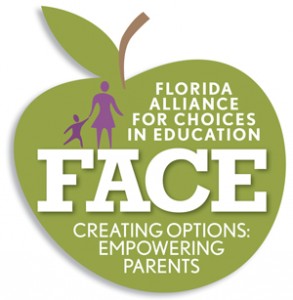 In 2010, Doug Tuthill took a look around and realized he was living in a new era.
In 2010, Doug Tuthill took a look around and realized he was living in a new era.
“Florida had this rapidly expanding portfolio of school choice options,” said Tuthill, the president of Step Up For Students, which administers the state’s tax credit scholarship program. “Yet there was little dialogue among the groups representing those choices. We weren’t talking to each other about what was working, what wasn’t, and why.”
Several important players in this bourgeoning movement recognized the need for more collaboration. Florida Virtual School and Step Up For Students, among others, wanted to see the school choice movement united, so they could learn from each other and talk through any differences.
Thus, FACE was born.
Florida Alliance for Choices in Education, or FACE, is comprised of more than 50 members, representing a diverse coalition of organizations dedicated to providing Florida school children with more educational options. Such organizations include National Coalition of Public School Options, Florida Charter School Alliance, Foundation for Florida’s Future, and StudentsFirst - all coming together with the belief that, as the FACE website says, “State policy should enable all parents to be fully engaged in their children’s education and to access those learning options that best meet their children’s needs.”
Step Up For Students (which co-hosts this blog) staffed the initial effort. Three individuals - Wendy Howard, a parent advocate from Tampa; Jim Horne, a former legislator and state education commissioner; and Julie Young, president and CEO of Florida Virtual School - spent a year facilitating outreach and diplomacy, eventually bringing all components of choice together in one organization.
Florida is the first state to do this. (more…)
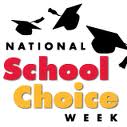 It’s only fitting: Florida, a trailblazer in expanding school choice, will be among the busiest states during National School Choice Week.
It’s only fitting: Florida, a trailblazer in expanding school choice, will be among the busiest states during National School Choice Week.
This year’s celebration, which officially begins Sunday, is by far the largest ever, with more than 3,500 events in 50 states, up from 406 last year. Florida has at least 134 events on the schedule.
One of the highlights will be here in Tampa - a panel discussion featuring two nationally recognized education leaders. One is new Education Commissioner Tony Bennett. The other is MaryEllen Elia, superintendent of Hillsborough County Public Schools, the third largest school district in Florida and eighth largest in the country.
The pair will join other panelists representing the charter, magnet, private, virtual and home-schooling sectors. The event is set for Tuesday at 3:30 p.m., at the Boys Preparatory Academy at Franklin Middle Magnet School, one of the state’s first single-gendered public middle schools.
Other speakers include selected students, parents and teachers who will talk about the need to provide all children with more access to educational options. The event is sponsored by the Florida Alliance for Choices in Education, a group of school choice advocates that includes Step Up For Students, the nonprofit that oversees Florida’s tax credit scholarship program and co-hosts this blog.
Organizers are calling this year’s National School Choice Week “the world’s largest celebration of education reform.” The idea behind it is to raise awareness about the value of school choice, the need for more of it and the broad coalition that backs it.
“A quality education can be the ticket to the American dream for children across America,” Andrew Campanella, president of National School Choice Week, said in a prepared statement. “We must fight to ensure that every child has the ability to go to a great school.”
 Beginning Monday, we have a special treat for you at redefinED - commentary about how far we've come with school choice in Florida, and where we may be headed.
Beginning Monday, we have a special treat for you at redefinED - commentary about how far we've come with school choice in Florida, and where we may be headed.
The prompt for this came at an April meeting of the Florida Alliance for Choices in Education, which includes many of the state’s choice groups. An alliance member noted the national spotlight had shifted in recent years to states like Indiana and Louisiana. Had Florida, so long on the cutting edge of the choice movement, lost some of its mojo?
Clearly, Florida remains a national leader and a national model. But the comment made us wonder. What will school choice in Florida look like in five or 10 years? How do we best continue expanding options so students benefit?
We turned to former Florida Gov. Jeb Bush, Education Commissioner Gerard Robinson and other leading voices for choice and asked. Graciously, they offered their thoughts and visions, which we’ll be running all next week.
Individually, the contributions are thoughtful and thought provoking. Collectively, they offer the outlines of a bigger picture – not just of the future of school choice in Florida, but of the future of public education.
First up on Monday: Commissioner Robinson.